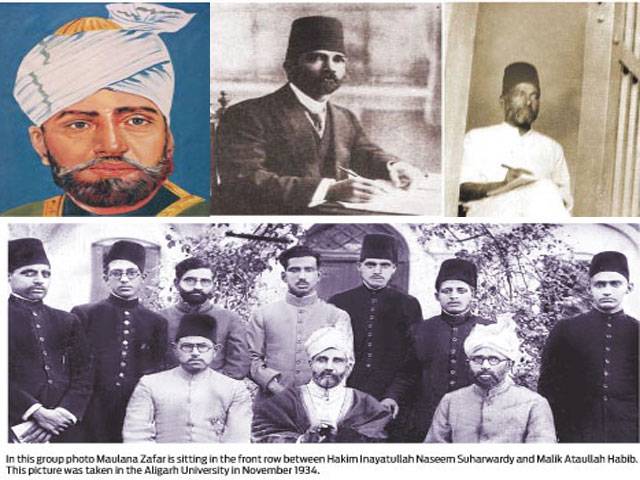Zafar Ali Kahn was one of the most eminent leaders of the freedom movement from Punjab. The man with extraordinary abilities ranging from oratory to poetry and from politics to journalism is mainly acknowledged as the father of Urdu journalism. Due to his extraordinary talent he got prominence among the great political leaders of the time, who were busy in their struggle for an independent sovereign state for the Muslims of the subcontinent. He was born in the Kot-Merath district Sialkot on January 27, 1874 in a well literate family. His father Maulvi Siraj-ud-din started Zamindar in 1903 that highlighted the interests and problem of the agricultural community and at the same time promoted social and political awareness among the Muslims. Maulana Zafar Ali Khan got his early education from Mission High School Wazirabad and Mahendra Singh College Patiala. He completed his graduation from M.A.O. College, Aligarh. He became secretary to Nawab Mohsin-ul-Mulk in 1895. Afterwards he joined “Hyderabad Translation Bureau” and later the home department of the same state i.e., Hyderabad Deccan.
After his father death in 1908 Zamindar was taken over by Maulana Zafar Ali Khan who had already established his literary reputation by a number of books he had written in addition to his editorship of the “Deccan Review”. Due to his ample experience in journalism, he also contributed articles to other magazines and newspapers. In his hands Zamindar became the most influential Urdu daily of Northern India that played a vital role in the Indian politics.
Bearing an anti-imperialist point of view, its popularity can be traced back from the fact that it has thirty thousand issues, which until 1947 no other newspaper can claim. The newspaper was the first voice of the Muslims in the Khilafat Movement and a powerful instrument for infusing a vigorous political life in the Punjab.
He was one of the supporters of the resolution, which led to the creation of All India Muslim League at Dhaka in 1906. He was the champion of the Muslim unity and brotherhood all over the world. This curiosity compelled him to collect funds for the Turks during Tripoli and Balkans Wars and visited Turkey as well. He played an active role during the Khilafat Movement and was elected first as secretary and later as President of Punjab Khilafat Committee.
Zafar Ali Khan was an excellent poet. His poetic works inculde Nigaristan, Chamanistan, Baharistan and Armagahan-e-Qadian.
He translated the famous book Al-Farooq by Shibli into English and Jinnah’s historic speech of 1940 into Urdu. Others literary works include Marka-e-Mazhab-o-Science, Ghalba-e-Rum and Shehr-e-zulmet. In 1935 he started Majlis-e-Ittihad-e-Millat and in the same year he was elected as a member of the Central Legislature from Lahore.
Zafar Ali Khan struggled hard to establish All India Muslim League, which faced resistance from the landlords particularly from the Unionist Party in Punjab. Maulana Zafar Ali Khan will be remembered with great respect and honour in the political history of Pakistan due to his contribution in the all walks of life. He died on November 27, 1956 and was buried at Karamabad Wazirabad.
Friday, April 19, 2024
Remembering the struggle

8:18 PM | April 19, 2024
Formula 1 returns to China for Round 5
9:05 PM | April 19, 2024
Germany head coach Julian Nagelsmann extends contract till 2026 World Cup
9:00 PM | April 19, 2024
IMF urges Italy, France to spend less, Germany to loosen purse strings
8:57 PM | April 19, 2024
PM calls UAE president, admires Emirati leadership's response to recent Dubai rains
8:55 PM | April 19, 2024
Church leader calls for including Christians in Gandhara Corridor
8:50 PM | April 19, 2024
A Tense Neighbourhood
April 19, 2024
Dubai Underwater
April 19, 2024
X Debate Continues
April 19, 2024
Hepatitis Challenge
April 18, 2024
IMF Predictions
April 18, 2024
Kite tragedy
April 19, 2024
Discipline dilemma
April 19, 2024
Urgent plea
April 19, 2024
Justice denied
April 18, 2024
AI dilemmas unveiled
April 18, 2024
ePaper - Nawaiwaqt
Advertisement
Nawaiwaqt Group | Copyright © 2024





